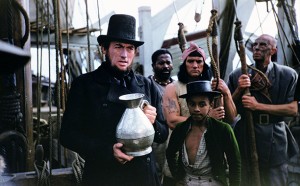 Critics were not kind to John Huston’s 1956 filming of Melville’s symbolic masterpiece, but it has much to commend it. Gregory Peck looked awkward in the role of Ahab, but in the scenes where he whips his crew into a collective frenzy (where Starbuck sees “a madman beget more madmen”) he was very effective. Ray Bradbury wrote the script, and I think it one of his most brilliant accomplishments, for it remains very true to the intentions and style of the book. Richard Basehart was fine as that simple soul, Ishmael, and Leo Genn performed brilliantly in the role of Starbuck. The special effects were superb for their time, though they might embarrass a film-maker today. Visual detail was accurate.
Critics were not kind to John Huston’s 1956 filming of Melville’s symbolic masterpiece, but it has much to commend it. Gregory Peck looked awkward in the role of Ahab, but in the scenes where he whips his crew into a collective frenzy (where Starbuck sees “a madman beget more madmen”) he was very effective. Ray Bradbury wrote the script, and I think it one of his most brilliant accomplishments, for it remains very true to the intentions and style of the book. Richard Basehart was fine as that simple soul, Ishmael, and Leo Genn performed brilliantly in the role of Starbuck. The special effects were superb for their time, though they might embarrass a film-maker today. Visual detail was accurate.
The world of the New Bedford whalers in the 1840s holds many surprises for a modern viewer. It was strikingly cosmopolitan — the whaling ships sailed every sea in the world, and Africans, Native Americans, Asians, Polynesians, and Europeans crewed the ships and walked the streets of New Bedford. People were genuinely, profoundly religious. Unlike the phony-balony “Christian fundamentalists” of modern America, who never actually read the bible, these people knew it by heart. Melville expected his readers to get every one of his thousands of biblical references in the novel. The movie captures both these elements exactly.
0 Comments.